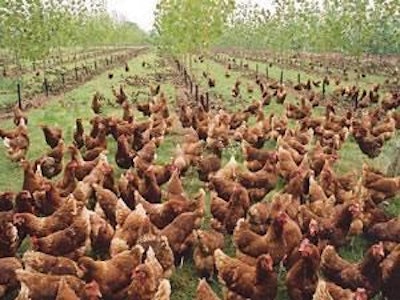
The term ‘animal welfare-friendly systems’ is now in common use e.g. in the current European Union 6th framework Rescape and Safehouse research projects. A Eurobarometer survey conducted in 2007 is reported as finding ‘Consumers were prepared to pay a higher price for animal products from more animal welfare friendly systems.’
So what does this term mean? Does it infer that animals kept in such systems are more comfortable, suffer less, have more freedom or are more content? Is it based on measurements and scientific facts, or is it a product of opinion or perception based on people’s feelings? Whatever their perceptions, can consumers actually discern whether the animal products they purchase come from superior systems in terms of animal welfare?
Consumer survey
A report called Consumer Attitudes to Animal Welfare indicated that ‘67% of consumers think animal welfare is an important issue and express most welfare concern about animals’ living conditions, what they are fed and hygiene on farms.’ (Ranger, March 2007). Greater concern about animals’ living conditions is based on media sources and television shows. In recently launching their Good Egg Award, a spokesperson for animal welfare charity, Compassion in World Farming (CIWF), stated, “Improving animal welfare practice makes good business sense. We know from surveys of European public opinion that laying hens are one of the top animals that consumers are concerned about, so eggs are a good place to start.” CIWF advocates the adoption of ‘higher animal welfare policies by going cage-free on eggs.’ (Ranger, April 2007).
Retailer responses
In their Corporate Social Responsibility Report 2007, UK supermarket chain Morrison’s indicated that all their own-brand eggs will be free range by 2010. Ranger (May 2007) reports a spokesperson saying, “Animal welfare is extremely important in the sourcing of our produce and we already have structured plans in place to reduce the amount of cage eggs within our business.”
Another major UK supermarket chain, Sainsbury’s, has committed itself to achieve ‘100% UK cage-free eggs as soon as possible.’ (Ranger, April 2007). Already over 50% of Sainsbury egg sales are free-range.
These supermarkets and some welfare groups are convinced that extensive systems of egg and poultry production are welfare-friendly and intensive systems are not but are they right?
Many consumers appear to agree although it is known from the Consumer Attitudes to Animal Welfare report that over 50% of them fall into the category ‘little or no welfare concern’ with respect of purchasing habits whereas only 10% fall into the ‘high welfare’ group. Of those who purchase free-range eggs, many also buy cage eggs for cooking. This behaviour hardly indicates deep concern for bird welfare if these people believe housing in cages equates to poor welfare.
















